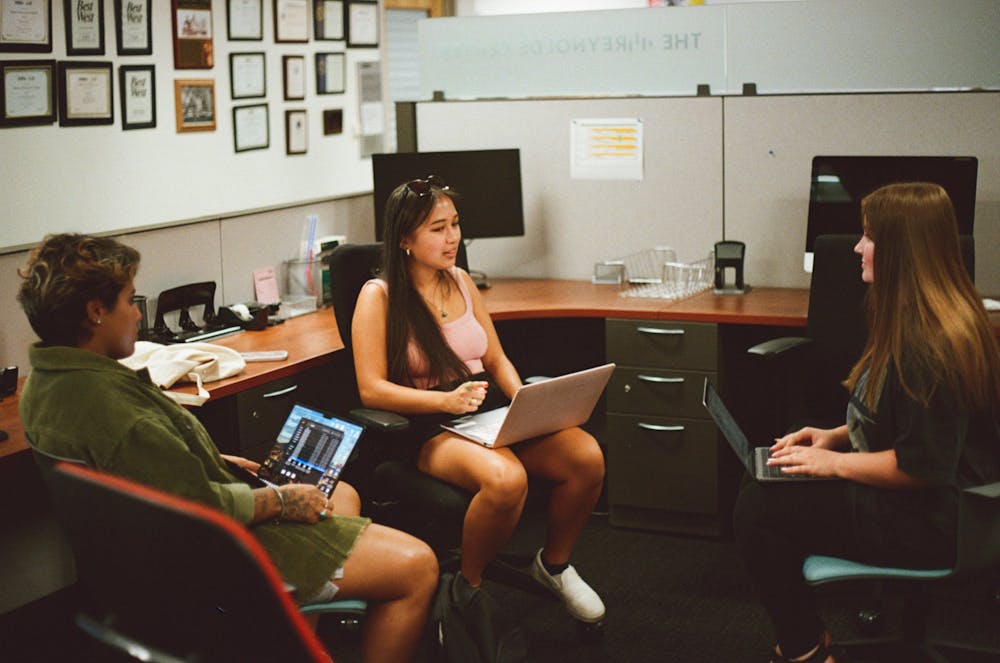Smartphones have come a long way, and now are able to take their own high-quality photos at the click of a button. But as quality photos have become extremely convenient to take, familiar styles have circulated back into the lens for young adults: film and digital cameras.
"With the advent of iPhone cameras being everywhere, it's not really special to take pictures anymore," said Ralf Petitt, a sophomore studying finance. "Film photography gives an excuse to be special."
The college scene often calls for a lot of pictures, and more and more are being taken on digital and film cameras, which may be a callback to the older ways of capturing memories.
Film and digital cameras produce photos with looks that are unique from everyday iPhone images. Yet for college photographers, it's not just for the aesthetic, but also the experience.
"I've always been huge on photography," said Jackie Gonzales, a graduate student studying digital audience strategy. "Using regular DSLR cameras, my phone, too, is great for photos, but I love the nostalgia of a film camera, of having to wait and not necessarily knowing what the photo looks like until you develop it."
Film photography is a long process, one that can often be expensive and require an extensive amount of materials. But the reward makes it worth it for many.
"When you're taking photos on the film, you actually have to sit with what you want to take," said Jake Zeitner, a senior studying film and media production and employee at Strap Film Lab in Mesa. "And you know you only have a certain amount of shots, so it really makes that process slow down a lot more."
Film is a lot more specific and thought out, especially when it comes to capturing people in different environments.
Digital cameras have a different vibe to them. Although it is easy to capture photos on these, it still requires some work afterward — usually downloading photos the day after for those who take their cameras to parties.
"I get home from a night out and all my friends are like, 'Oh my god, can you send the picture?'" Gonzales said. "It builds up the anticipation with everyone."
The beauty of both of these types of photography stems from the nostalgia that comes with it.
"Every generation is struck by a nostalgia for what they didn't go through," Petitt said.
This nostalgia most likely accounts for why Gen Z gravitates toward unique methods of capturing photos. It adds a new dimension for what it means to tell people to pose and get ready.
"I definitely think that it's become a lot more popular, especially disposable cameras," Zeitner said. "Disposable cameras are the easiest way to understand what film photography is because you don't have to load the film, you don't have to do any settings, you literally just wind it and shoot."
Different types of digital, like a standard DSLR, are easy for students to get their hands on, whether through thrift stores or even from older family members.
Getting started in film as a hobby may prove to be expensive, as high-quality film cameras can cost hundreds of dollars. For ASU students, however, there are other methods to get started.
"Some of the best cameras you can find are from the thrift and if you take it to one of your local shops you can see if it works or not get it fixed up," Zeitner said.
READ MORE: Stop and cop: Top 5 places to thrift near ASU
"YouTube has an absolute wealth of information. So does Reddit, and it's not coming from old heads anymore," Petitt said. "It's coming from young people who have had the chance to experience this form of photography from square one."
Users say it's a special feeling to be able to wait to see the styles and types of pictures that are different than what a typical phone camera may hold — so for now, throwback film or digital photography is far from dead. If anything, it is making a resurgence among Gen Z.
"I love film," Zeitner said. "Keep it alive."
Edited by Andrew Dirst, Sophia Braccio and Natalia Jarrett.
Reach the reporter at gachatht@asu.edu.
Like The State Press on Facebook and follow @statepress on X.
Gokul is a sophomore studying actuarial science. This is his fourth semester with The State Press.




